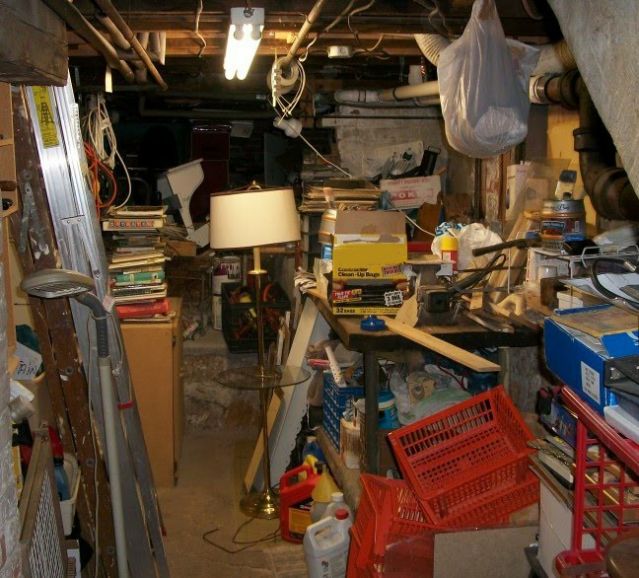Child Development
Using Imagination to Reduce Clutter In Your Home
What if I lose one of my copies of The Joy of Cooking?
Posted September 6, 2012

A cluttered basement.
Some people naturally are able to remove clutter from their lives. Others, like me, naturally collect things and have a hard time letting go of them.
Shortly after I moved into my house here in Ottawa, I realized that I was absolutely overflowing with books. I started having parties in which I would give books away. I called them "book swap parties," and encouraged people to bring books they didn't want.*
Still, parting with things is hard, because we are afraid that if we get rid of something, we'll miss it. Part of this is because of something called the endowment effect: when we own something, we value it more than we would have been willing to pay for it when we didn't have it.
I had this problem at work, too. I have lots of phone-book-sized conference proceedings from the 1980s and '90s taking up space on my shelves. Turns out that my workplace offers a service in which they will saw off the binding and scan it into a PDF. I did this with one, but I think the total cost was over $20. It was not worth it to me. In fact, I realized that I would not have paid $20 for the conference proceedings if I did not own it.
That is the trick.
Let's say you have a digital camera that you are thinking of getting rid of. You can go onto ebay and find out how much similar cameras have sold for. This gives you a good idea of what you could get for yours if you sold it. Now, ask yourself: "If I didn't already own this camera, would I pay that much for it?" If the answer is no, then sell it immediately. Indeed, if you have remorse you can always buy another one, probably for a cheaper price.
If you do this exercise with things in your house, you'll realize how little you actually value some of your things you can't part with.
Why does it work? Because you are using your imagination to overcome the endowment effect. By imagining that you don't own it, you get a better idea of its value to you.
Here's another tip. Some things you feel you can't part with because they are nostalgic, and of absolutely no value to anyone else, so the ebay trick won't work. I have lots of toys from my childhood that I can't bear to get rid of. I have lots of crappy sculptures I made in high school art class filling boxes in my basement. One way I have managed to get rid of some of this stuff is by photographing it.
I take a picture, and save it in a folder called "nostalgia." Once I have this picture, I feel better about giving or throwing away the object, because part of why I wanted to save it was because I didn't want to forget. Now I save much fewer of these little things.
Once in a while I browse the nostalgia folder, and it feels great. I don't even have to open boxes in my basement.
Happy cleaning.
* Although these parties always have a good turnout, some people didn't come because they didn't have a book to swap. So then I called the parties "book give away parties," figuring that it was the "swap" word that was making it sound like a transaction. Then some people didn't come because they did not have a book to "give away." Maybe I'll call the next party "please take my books and if you happen to have any that you want to get rid of too bring them party." I'm at my wit's end here.


